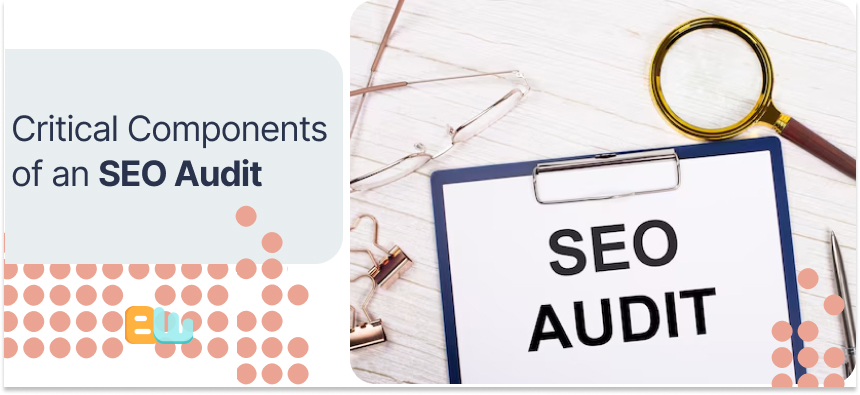
In the ever-changing world of search engine optimization, keeping up with new methods and strategies is essential if you want your website to do well. A free SEO audit is critical to ensure your site is set up correctly for search engines. With this audit, you get valuable insights into how well your website is doing and what parts might need work. It helps you figure out how reasonable your current SEO efforts are, see where your website shines or falls short, and make the necessary changes to climb higher in search engine rankings.
The Role of a Free SEO Audit

A free SEO audit is super essential for your whole SEO game plan. It lets you check out how your website’s doing and spot what needs to improve. When you dive deep into an audit, you learn much about what’s working well and what’s not on your site. This knowledge helps you make intelligent choices to boost your SEO work. With the help of a free SEO audit, you can find out exactly what to do to climb up in search engine rankings and pull in more visitors naturally.
Identifying Your Website’s SEO Strengths and Weaknesses
To make your website work better, it’s essential to figure out what’s good and could be better about its SEO. When you do an SEO audit, you see where you need to improve, like how well your keywords are working, the experience for people using your site, and how you stack up against others. Finding these things gives you some great ideas on how to climb higher in search engine rankings and pull in more visitors without having to pay for ads.
Analyzing keyword usage and effectiveness
When you do a free SEO audit, you must look at how you use keywords and whether they work well. This means checking if the keywords you want people to find your website with are in your website’s content and seeing how these words do when people search for them online. By figuring out which of your chosen keywords are doing their job, you can tweak what kind of stuff you put on your site so more folks can find it when they’re looking up things online.
Evaluating website performance and user experience
When doing a free SEO audit, it’s crucial to look at how well your website works and if people enjoy using it. This means digging into user data like bounce rate and how long folks stay on your site to understand what they do when they visit. On top of that, checking how fast your pages load and if your site looks good on phones is critical for ensuring everyone has a smooth user experience, no matter the device. By focusing on these areas, you can make your website better both for users and for where it shows up in search engine results.
Benchmarking against competitors and industry standards
When doing a free SEO audit, it’s essential to see how your website stacks up against others in your field and what the usual standards are. This means looking closely at other websites similar to yours to figure out where you stand with search engine rankings and how well your SEO is doing overall. By comparing yourself to these benchmarks, you can spot room for improvement and plan how to climb higher in search engine results.
Critical Components of an SEO Audit

A thorough SEO check-up looks at three main things: the technical bits of your website, how each page is set up, and what’s happening away from your site. With technical SEO, we’re talking about all the behind-the-scenes stuff that helps your site improve in rankings—things like how it’s built and whether search engines can easily understand what’s on there. On-page SEO means ensuring each page on your website is ready to shine in search results by working on meta descriptions and planning out your content well.
On-Page SEO Analysis
When doing an SEO audit, an essential part is looking at your site’s on-page SEO stuff. This means checking if meta descriptions and title tags use the right keywords and showing what’s on your web pages. Also, looking at how you plan out your content can point out where you need to improve, like making sure you’re using relevant keywords and creating content people want to read. By analyzing all this on-page SEO business, you can make changes that help more people find your website through search engines and boost organic traffic.
Off-Page SEO Evaluation
Looking at your website’s off-page SEO is vital to an SEO audit because it’s all about ensuring your site is seen as trustworthy and authoritative. This means checking out who’s linking to you and ensuring those links come from well-respected places that make sense for your site. On top of that, seeing how you’re doing on social media and with digital marketing efforts plays a significant role in figuring out if you’re getting the word out effectively about your website and building up an online presence.
Technical SEO Assessment
A technical SEO assessment is an essential part of an SEO audit as it focuses on the technical aspects of your website that affect its performance in search engine rankings. This includes analyzing site structure, speed, crawlability, and indexing. By conducting a technical SEO assessment, you can identify any technical issues hindering your website’s SEO performance and make necessary improvements. Here is a breakdown of the key technical aspects to consider:
On-Page SEO: Enhancing Content and Structure

On-page SEO is super important if you want your website to rank better in search engine results. It’s all about ensuring the stuff you write and how your website is put together are top-notch. When you create content that matters to the people you’re trying to reach, they stick around longer, telling search engines like Google that your site is worth checking out. This can help bump up where your site appears when someone searches for something related. Also, sorting out what your web addresses look like and linking pages within your site smartly makes it easier for these search engines to figure out what’s on your website.
Optimizing Title Tags and Meta Descriptions
Making your title tags and meta descriptions better is vital for on-page SEO. Title tags are bits of HTML that name your web page, showing up as the big headline when you see results in a search engine. Meta descriptions are also HTML elements, giving a quick overview of what’s on your web page. Using specific keywords in these areas helps search engine crawlers get what your pages are about, leading to more people clicking through from the list of search results.
Improving URL Structure and User Experience
Having a neat and easy-to-understand URL structure is essential for on-page SEO. It makes it easier for both search engines and people visiting your site to get what your website’s content is all about. Ensuring your URLs are clear, you’re helping your site appear better in search results and making the experience friendlier for everyone who stops by. On top of that, linking pages within your website plays a big part, too. This internal linking helps connect different parts of your site, making it more straightforward for visitors to find their way around.
Off-Page SEO: Building Authority and Trust

Off-page SEO is super important if you want your website to do well in search engine rankings. It’s all about ensuring people see your site as trustworthy and authoritative. This involves many strategies like getting links from other respected websites (that’s link building) and showing up online, not just on your site but also through social media and digital marketing efforts. When you get good-quality links from sources that are seen as reputable, it tells search engines that your website is a big deal, which can help bump up where you appear in searches.
The Power of Backlinks
Backlinks are like a thumbs-up from other websites to yours, showing that your site is valuable and trustworthy. When you have lots of good backlinks, search engines see your website as an essential place for information.
With an SEO audit, checking out both the good and not-so-good links pointing to your site becomes easier. It spots any bad links that could be dragging down your rank on search engine results pages (SERPs). Knowing this lets you focus on grabbing better-quality links, boosting both your site’s authoritativeness and visibility in searches.
Social Media’s Role in SEO
Social media is essential for making your website more visible on search engines. It’s a great way to connect with people, make your brand known, and share stuff that matters. Using social media the right way can help bring more visitors to your site naturally and boost its place in search engine results.
Doing an SEO audit lets you check if what you’re doing on social media works well to boost traffic from those sites to yours. It shows which platforms are best at sending visitors over and what things they like reading or seeing most from you. Fine-tuning how active and smartly engaged you are on these networks based on the audit’s insights bumps up where Google places pages and makes them more accessible for folks searching online.
Technical SEO: Ensuring a Solid Foundation

It’s super important to ensure your website has a strong base, and that’s where technical SEO comes in. It’s all about tweaking the nuts and bolts of your site so it works better and feels nicer for people using it. The big things you need to focus on include how fast your pages load, making sure your site looks good on phones, keeping everything secure with HTTPS, and using XML sitemaps.
Page speed is key for keeping visitors happy and getting noticed by search engines, so having a quick-to-load site can really make a difference. Since lots of folks surf the web on their smartphones these days, mobile optimization is crucial, too. By ensuring that visiting your website is smooth no matter what device someone uses, you’re setting yourself up for better visibility online.
Mobile-Friendliness and Site Speed
In the world we live in today, where everyone is always on their phones, it’s super important to have a website that not only looks good on mobile but also loads quickly. This matters a lot because when people use Google or any other search engine to find something, those search engines will show websites that are easy to use on phones higher up than others.
When we talk about being “mobile-friendly,” we mean how well your site works and looks on different sizes of screens, especially smartphones. A mobile-friendly website ensures visitors don’t get frustrated trying to click tiny buttons or read small text; everything should be easy for them. Responsive design plays a big part here—no matter if someone’s looking at your site from an old phone or the latest tablet, your website adjusts so it’s still easy for them to use.
Secure Connections and XML Sitemaps
Secure connections and XML sitemaps are key parts of technical SEO, which help keep your website safe and make it easier for search engines to find you.
Secure connections like HTTPS make it safe for people to interact with your site. Search engines care about user safety, so they prefer websites with secure links. By making sure your site uses HTTPS, you boost its security and position in search engine rankings.
XML sitemaps act as guides for search engines by showing them the layout of your site. This makes it simpler for these search engines to crawl through and index each page on your website correctly. With an XML sitemap, more of your pages can show up in the right places when people look things up online, which means better visibility and overall performance.
Common SEO Mistakes to Avoid

When making your website more visible on search engines, there are a few slip-ups you should steer clear of to ensure all your hard work pays off. These blunders can mess with how high up your site shows in search results and how users feel when they visit.
By avoiding common pitfalls and regularly checking for tech hiccups, you can improve your ranking in search engine listings and make visits friendlier for everyone who stops by.
Overlooking Mobile Optimization
Making sure your website works well on phones is super important, but sometimes people need to remember about it. With more and more folks using their smartphones for everything, having a site that looks good and runs smoothly, no matter the screen size is critical.
When we talk about making your site phone-friendly, we mean tweaking it so it loads fast and looks right on small screens. This involves creating a responsive design that changes layout based on the device’s screen size and making sure pages load quickly for those browsing on mobile. If you pay attention to this stuff, Google might show your site less in search results, and people visiting might get frustrated with slow loading times or hard-to-use pages.
Ignoring Website Speed and Performance
The speed and quality of your website are super important when it comes to keeping both users and search engines happy. People surfing the web want websites that load quickly and let them browse without any hiccups. Search engines also give better spots in their results to websites that don’t take forever to load.
If you ignore making your website fast and smooth, you might find more people leaving your site too soon (that’s called a high bounce rate), not as many people doing what you’d like them to do on your site (which means lower conversion rates), and even slipping down in those all-important search engine rankings. A slow website can turn off visitors, ruining their time on your site.
Implementing Changes Post-Audit

Implementing the suggestions from an SEO audit is key to maintaining and boosting your website’s SEO performance. An SEO audit gives you important clues about what needs work and tips for improving.
With these changes, it’s a continuous effort. You’ve got to keep checking and tweaking your site based on what the SEO audit tells you. This way, your site stays in top shape and maintains good standing in search engine rankings.
Prioritizing SEO Recommendations
After you check your website to see how it can do better in search results, it’s smart to pick the changes that will make a difference and are easy to do first. Only some suggestions or something you immediately jump on will be a top priority.
By figuring out which SEO tips are the most important and doable, you can quickly improve your website’s performance. This will help you improve faster, this will help you fix what needs fixing to help people find your site more efficiently and improve their visit there.
Tracking Progress and Adjusting Strategies
Keeping an eye on how things are going and tweaking your plan is key to improving your SEO. After you’ve made the changes suggested in a check-up, it’s crucial to monitor your website’s performance and change things up when necessary.
With Google Analytics, you have an excellent tool for seeing how well you’re doing by looking into important stuff like organic traffic, how users interact with your site, and conversion rates. By checking these numbers often, you can figure out if what you’re doing for SEO is working or if there are spots where you could do better.
Conclusion
In search engine optimization, getting a free SEO audit helps you figure out what’s working well and what needs improvement on your website. By looking into how you use keywords, checking out how fast your site loads, and seeing where you stand compared to others in your field, you get valuable info that helps improve your site. It covers everything from making changes on your pages to figuring out strategies involving other sites or technical stuff behind the scenes. The key is to avoid common mistakes people make with SEO, implement what you’ve learned after the audit, and keep an eye on how things change over time—remembering that doing well in search engines means always being ready to update and adjust as their rules change is essential, too. If you stay ahead of the game and keep improving, there’s no limit to how high up in search engine rankings your online presence could climb.
